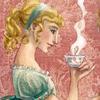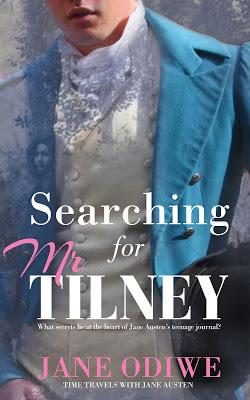 Jane Odiwe has just released a new book inspired to Jane Austen’s Northanger Abbey titled “Searching for Mr Tilney” (more about the book below). Loving Mr Tilney immensely, and while waiting to have a copy of the novel in my hands, I thought: “Maybe Jane has found out the answers to my perennial questions about Henry while writing her new book!” So I wrote down a few of my questions and sent them to her and she kindly and generously granted me her thoughtful answers.
Jane Odiwe has just released a new book inspired to Jane Austen’s Northanger Abbey titled “Searching for Mr Tilney” (more about the book below). Loving Mr Tilney immensely, and while waiting to have a copy of the novel in my hands, I thought: “Maybe Jane has found out the answers to my perennial questions about Henry while writing her new book!” So I wrote down a few of my questions and sent them to her and she kindly and generously granted me her thoughtful answers. What are Henry Tilney’s best qualities, Jane, and is there anything we didn’t know about him that we could find out reading your new book?Henry is handsome, intelligent, witty, and fun to be around. Catherine is clearly drawn to these qualities when she first meets him in Bath and delights in his teasing ways. She’s very naïve and inexperienced with men, and when she meets Henry who is seven or eight years her senior, it’s easy to see how the mature young man who can talk about history and art, and readily gives his opinions on many subjects would immediately captivate her. Searching for Mr Tilney is not a re-telling of Northanger Abbey, but I have four male characters that share some, if not all of Henry’s characteristics. In 1975 Harry is a Theology student who has spent some time traveling in Africa. He meets Caroline, a fashion student who is studying in London and who shares some of Catherine’s naivety and love of Gothic novels. Like Henry, I hope you’ll find Harry charming, witty and lively!
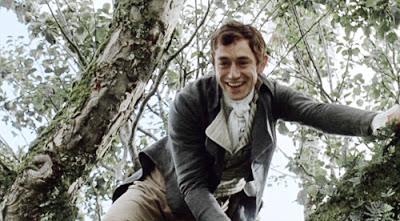 Running alongside is a story about Jane Austen’s sister Cassandra who, having known Tom Fowle as a pupil of her father’s, meets him again in Bath in 1789. It struck me that there was the same age gap between Tom and Cassandra that exists between Catherine and Henry in Northanger Abbey, and of course Tom Fowle was also a second son and a clergyman like Henry. I couldn’t help wondering if Jane included these tidbits on purpose to amuse her sister. I imagined Cassy would have been much in awe of Mr Fowle from a young age and ready to fall in love with him, as she grew older. Was Henry Tilney’s character partly influenced by Tom Fowle, I wonder?
Running alongside is a story about Jane Austen’s sister Cassandra who, having known Tom Fowle as a pupil of her father’s, meets him again in Bath in 1789. It struck me that there was the same age gap between Tom and Cassandra that exists between Catherine and Henry in Northanger Abbey, and of course Tom Fowle was also a second son and a clergyman like Henry. I couldn’t help wondering if Jane included these tidbits on purpose to amuse her sister. I imagined Cassy would have been much in awe of Mr Fowle from a young age and ready to fall in love with him, as she grew older. Was Henry Tilney’s character partly influenced by Tom Fowle, I wonder?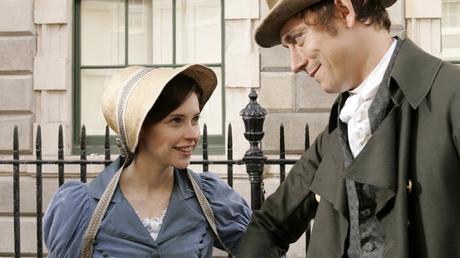 Jane Austen meets her very own Henry Tilney in the character of her second cousin Thomas in Kent in 1788 in my novel. Jane’s relationship and thoughts on him are revealed in a journal that Caroline finds in 1975. Jane is at a stage in her life when she doesn’t want to grow up, but when she meets her kind cousin Thomas with his love of sport and riding she begins to change her mind about the future. He also shares some of Edmund Bertram’s qualities.Finally, in Searching for Mr Tilney, Piers Howarth embodies characteristics of Henry Tilney’s more feminine side. We know Henry is gentle and kind, at ease in women’s company, a close confidante of his sister. He is an expert on fabrics - muslins to be exact, quite an astonishing fact to admit in a world where the Georgian man was required to behave in a very ‘manly’ way. In 1975 Caroline comes to adore Piers who gives her great advice on men and the world, and also shares her love of pretty china, fashion and painting.
Jane Austen meets her very own Henry Tilney in the character of her second cousin Thomas in Kent in 1788 in my novel. Jane’s relationship and thoughts on him are revealed in a journal that Caroline finds in 1975. Jane is at a stage in her life when she doesn’t want to grow up, but when she meets her kind cousin Thomas with his love of sport and riding she begins to change her mind about the future. He also shares some of Edmund Bertram’s qualities.Finally, in Searching for Mr Tilney, Piers Howarth embodies characteristics of Henry Tilney’s more feminine side. We know Henry is gentle and kind, at ease in women’s company, a close confidante of his sister. He is an expert on fabrics - muslins to be exact, quite an astonishing fact to admit in a world where the Georgian man was required to behave in a very ‘manly’ way. In 1975 Caroline comes to adore Piers who gives her great advice on men and the world, and also shares her love of pretty china, fashion and painting.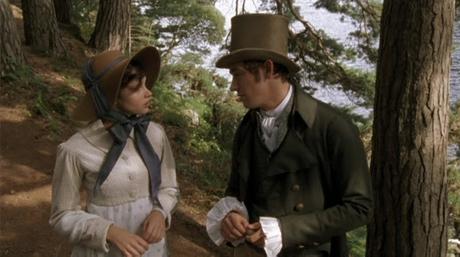 Jane Austen has Henry very much in touch with his feminine side - he appears to understand women even if he sometimes pretends he doesn’t, which often gives out confusing signals. Henry manages to educate and influence Catherine and helps her to use her common sense. These are wonderful qualities that I’ve also given to the heroes in my book. I hope in reading the characters I’ve created, you may also discover more about Jane’s Henry, though my ‘nods’ to Henry are by no means exact or complete. My characters all have their own traits and personalities for the benefit of my story. As usual, there are many references to Jane’s novels and letters - I hope you’ll enjoy finding them!
Jane Austen has Henry very much in touch with his feminine side - he appears to understand women even if he sometimes pretends he doesn’t, which often gives out confusing signals. Henry manages to educate and influence Catherine and helps her to use her common sense. These are wonderful qualities that I’ve also given to the heroes in my book. I hope in reading the characters I’ve created, you may also discover more about Jane’s Henry, though my ‘nods’ to Henry are by no means exact or complete. My characters all have their own traits and personalities for the benefit of my story. As usual, there are many references to Jane’s novels and letters - I hope you’ll enjoy finding them!Henry is so different from his father and his elder brother. How do you imagine his childhood in that family and at Northanger Abbey?I think General Tilney is one of Jane Austen’s most unpleasant characters. He’s a tyrannical father who abuses the power over his children, though I think Jane Austen was clearly parodying the role of fathers in Gothic literature. For all his bluster and opinions Henry is a sensitive soul, and I cannot imagine him having much in common with his father beyond the handsome looks we are told they share. Henry’s brother seems to share more of his father’s characteristics, and I can’t imagine the siblings being close when they were young. Growing up, Henry must have been very close to his sister, and the closeness has clearly remained. Henry is a kind brother who, I’m sure, took even greater pains with his sister after their mother died. I can imagine these two siblings being much closer to their mother, and perhaps having spent more time with the females in his family, Henry has a greater understanding of women as a result.
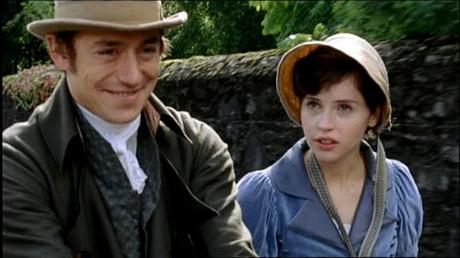
His relationship with Eleanor, his sister, is on the contrary a very special one. Do you think it might have been inspired by Jane Austen’s special relationship with her favorite brother?I think that’s a great possibility - perhaps Jane named him Henry as an affectionate tribute to her brother, though I don’t imagine Henry Tilney in quite the same way as Jane’s Henry. I think Jane’s characters, though influenced by people she knew, were not complete portraits.
When he meets Catherine Morland in Bath, what is it that he especially likes in the girl?When Henry meets Catherine I think he especially likes the fact that she’s young, pretty and has a fresh naivety about her. Her character is in complete contrast to the worldly Isabella, and I’m sure he’s already met several Isabellas in Bath. I also think he likes the idea of transforming Catherine or seeing the possibility that he might be able to help mold her character. He takes great pains to tutor her on people, books and the picturesque amongst other subjects, and as Catherine is a willing pupil, and clearly in awe of him, she is made the more charming to him.
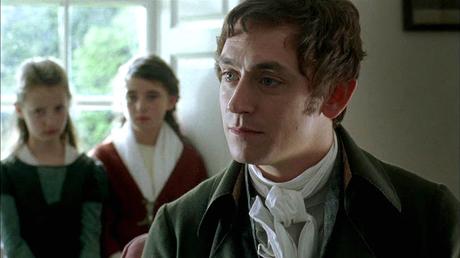
To be honest, I’ve always thought that Catherine and Henry were a bit mismatched. He’s smart, brilliant, witty. Catherine has none of those qualities. Am I totally wrong, and do you think Mr Tilney will help Catherine to improve in their married life?
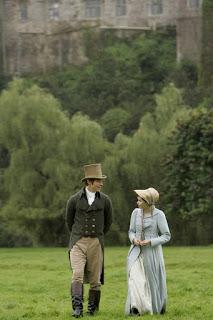 Although we’re told Catherine is not particularly smart or intelligent at the beginning of the book I think her demonstration of a desire to change and a new yearning for education grows throughout the novel. Ultimately she learns much about herself and human nature, so that we have a different opinion of Catherine by the end of the book. She becomes more emotionally mature, learning to cope with unpleasant characters and learning to discriminate, as a result, when making new friends and acquaintances. Under Henry’s influence she changes rapidly and grows as a person who stops letting her wild imagination run away with her. We know previously she’s been reading too many Gothic tales to the extent that she only sees life mirrored in them, but as she realises the folly of her ways, Catherine is finally resolved not to read any more. Perhaps, as time goes on, under Henry’s patient tutelage, she will improve her mind by extensive reading on other subjects so she can become more equal in intellect to him! They both share a love for reading novels, and as Catherine is so keen to ‘improve’ I think their future has a lot of promise. Henry shows how much he likes giving her his opinions and educating her, and I think this would carry on in their married life. While she may not be his intellectual equal at present, she is only seventeen, and as I’m sure we all know when we look back on our youthful selves, a desire to learn more is often greater as we get older.
Although we’re told Catherine is not particularly smart or intelligent at the beginning of the book I think her demonstration of a desire to change and a new yearning for education grows throughout the novel. Ultimately she learns much about herself and human nature, so that we have a different opinion of Catherine by the end of the book. She becomes more emotionally mature, learning to cope with unpleasant characters and learning to discriminate, as a result, when making new friends and acquaintances. Under Henry’s influence she changes rapidly and grows as a person who stops letting her wild imagination run away with her. We know previously she’s been reading too many Gothic tales to the extent that she only sees life mirrored in them, but as she realises the folly of her ways, Catherine is finally resolved not to read any more. Perhaps, as time goes on, under Henry’s patient tutelage, she will improve her mind by extensive reading on other subjects so she can become more equal in intellect to him! They both share a love for reading novels, and as Catherine is so keen to ‘improve’ I think their future has a lot of promise. Henry shows how much he likes giving her his opinions and educating her, and I think this would carry on in their married life. While she may not be his intellectual equal at present, she is only seventeen, and as I’m sure we all know when we look back on our youthful selves, a desire to learn more is often greater as we get older. About the bookSearching for Mr Tilney - What secrets lie at the heart of Jane Austen’s teenage journal? When Caroline Heath is taken to Bath in 1975, she little expects to find the gothic adventure she craves, let alone discover Jane Austen’s secret teenage journal, or how it’s possible to live in someone else’s body. Yet, she’s soon caught up in a whirlwind of fantastic events - travels through time, a love story or three, and even the odd sinister murder - or so she thinks. As the past and present entwine, Jane’s journal reveals a coming of age tale, set against the scandalous backdrop of Knole Park in Kent, and the story behind an enigmatic portrait. In Bath, a Georgian townhouse acts as a portal in time, and Caroline finds herself becoming Cassandra Austen, a young woman making her debut in society, torn between family duty and the love of her life. As the riddles unfold, and the lines blur between illusion and reality, will Caroline find the happiness she seeks or will she indulge her wild imagination, threatening her future and a fairytale ending?
Jane OdiweJane Odiwe lives in North London with her husband, children and two cats, but escapes to “Fairyland”, Bath, whenever she can. When she’s not writing she enjoys painting, reading, and music, and loves spending time with her family.
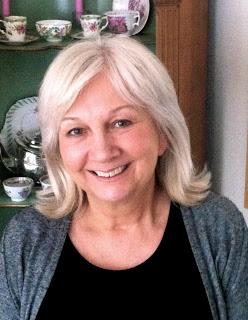 Twitter Website Blog Facebook
Twitter Website Blog FacebookFor more Mr Tilney read my old post
“ Henry Tilney, the Hero of Northanger Abbey”
